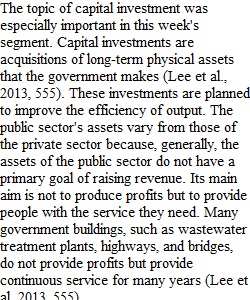


Q Introduction Students are expected to reflect on what they have learned about public budgeting and finance from their textbook each unit, including “take-aways” that will be useful in their future careers. Directions Students are expected to reflect on at least TWO lessons that they have learned from their readings in the textbook (Lee, Johnson, and Joyce) this unit and write 1-2 short paragraphs for each lesson learned. Comments should focus on the implications for public budgeting and finance based upon topics they have found especially relevant. 1) Add Title page and Reference page 2) Double-spaced, Times New Roman 12 font 3) Make sure to add citations and references formatted according to APA style. 4) DO NOT use direct quotes. Instead paraphrase and properly cite summarized information. Due Dates: 11:59 p.m. Sunday CT.
View Related Questions